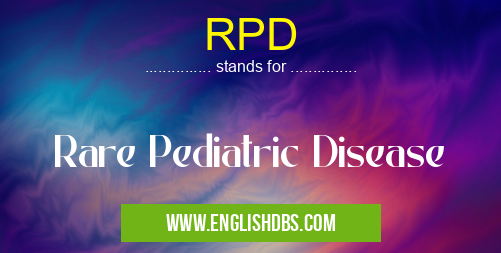What does RPD mean in PEDIATRIC
RPD stands for Rare Pediatric Disease. RPDs are a group of rare diseases that affect children. They are defined as diseases that occur in fewer than 200,000 people in the United States. There are an estimated 7,000 RPDs, and they affect approximately 1 in 12 children.

RPD meaning in Pediatric in Medical
RPD mostly used in an acronym Pediatric in Category Medical that means Rare Pediatric Disease
Shorthand: RPD,
Full Form: Rare Pediatric Disease
For more information of "Rare Pediatric Disease", see the section below.
What is an RPD?
RPDs are a diverse group of diseases that can affect any organ system. They can be caused by a variety of factors, including genetic defects, environmental exposures, and infections. RPDs can range in severity from mild to life-threatening.
Symptoms of RPDs
The symptoms of RPDs can vary depending on the specific disease. However, some common symptoms include:
- Developmental delays
- Physical abnormalities
- Intellectual disabilities
- Behavioral problems
- Seizures
- Vision problems
- Hearing problems
- Heart problems
- Lung problems
- Kidney problems
Diagnosis of RPDs
The diagnosis of RPDs can be challenging, as there is no single test that can diagnose all RPDs. Doctors typically diagnose RPDs based on a child's symptoms, family history, and physical examination. In some cases, genetic testing may be necessary to confirm a diagnosis.
Treatment of RPDs
There is no cure for most RPDs. However, treatment can help to improve a child's quality of life and prevent complications. Treatment options for RPDs vary depending on the specific disease.
Essential Questions and Answers on Rare Pediatric Disease in "MEDICAL»PEDIATRIC"
What are Rare Pediatric Diseases (RPDs)?
RPDs are medical conditions that affect children and occur in less than 200,000 individuals in the United States. These diseases often present unique challenges due to their rarity, making diagnosis and treatment complex.
What are the common types of RPDs?
RPDs cover a wide range of conditions, including genetic disorders, metabolic diseases, and neurological disorders. Some examples include cystic fibrosis, sickle cell disease, and spinal muscular atrophy.
Why are RPDs difficult to diagnose?
The rarity of RPDs often makes it challenging for healthcare providers to recognize and diagnose them. Symptoms may be vague or nonspecific, and there may be limited information available about the disease.
How are RPDs treated?
Treatment options for RPDs vary depending on the specific condition. Some RPDs may have specific treatments or medications available, while others may require supportive care or symptom management. Research and clinical trials play a crucial role in advancing treatments for RPDs.
What resources are available for families affected by RPDs?
There are many organizations and resources available to provide support and information to families affected by RPDs. These organizations offer educational materials, connect families with others going through similar experiences, and advocate for research and awareness.
Final Words: RPDs are a group of rare diseases that affect children. They can be caused by a variety of factors and can range in severity from mild to life-threatening. The diagnosis and treatment of RPDs can be challenging, but there is hope for children with these diseases.
RPD also stands for: |
|
| All stands for RPD |
